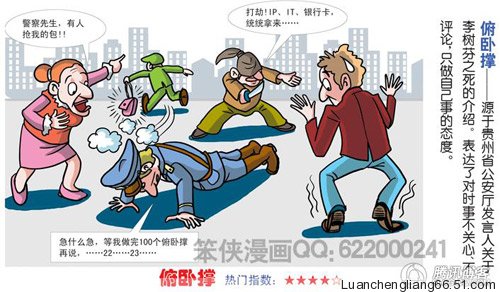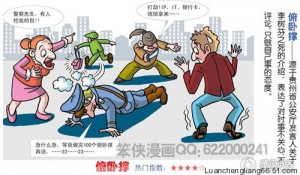This exercise took on new meaning in 2008 when police claimed the son of a government official had not raped a girl, alleging instead that he had been “doing push-ups.” Backlash against this suspected cover-up resulted in the Weng’an riot.
The young man was alleged to have raped and killed a 16-year-old girl. In an attempt to quell the outcry, police claimed that the boy and girl had been arguing along the bank of a river. When they had calmed down, the boy began to do some push-ups. After he had done three, he heard her say, “I’m going,” after which she jumped into the river and drowned herself.
Few believed the police account, and a riot ensued involving tens of thousands of people. “I was doing push-ups” became a coded critique of any unpersuasive police excuse. As the phrase has spread, it has shed much of its political connotation. It no longer has just one definition: sometimes it means “minding one’s own business,” while other times it refers to a nonsensical cause of death.
Other official police accounts of individuals’ deaths have attracted similar scorn. See death from drinking boiled water and death by hide and seek.
 The Word of the Week comes from China Digital Space’s Grass-Mud Horse Lexicon, a glossary of terms created by Chinese netizens and frequently encountered in online political discussions. These are the words of China’s online “resistance discourse,” used to mock and subvert the official language around censorship and political correctness.
The Word of the Week comes from China Digital Space’s Grass-Mud Horse Lexicon, a glossary of terms created by Chinese netizens and frequently encountered in online political discussions. These are the words of China’s online “resistance discourse,” used to mock and subvert the official language around censorship and political correctness.








